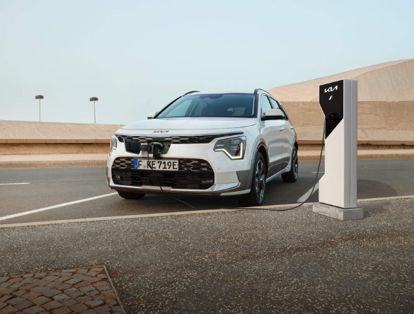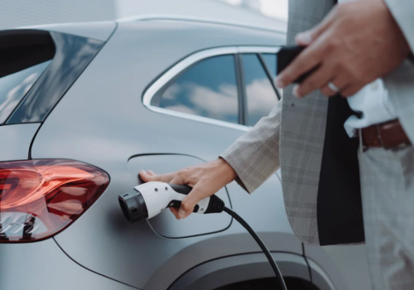
Public charging guide
Public charging is easy! Here's our guide to charging your new electric vehicle using the public charging network.
Public Charging vs Home Charging
Public charging
Public charging can be extremely convenient for those who are always on the move, found everywhere around the country in car parks, service stations and hotels - amongst other places. Nowadays, some electric vehicles can charge from 0-80% in under 20 minutes using a 350kWh public charger, meaning you can be on your way in the time it takes to enjoy a cup of coffee.
Home charging
Home charging is great for those who mostly keep their vehicle on their driveway or in their garage. Having the ability to charge at home gets your electric vehicle ready for any journey, ensuring that you start the day with a full battery. It's almost always cheaper to charge your EV at home too, as you can take advantage of special off-peak electricity plans from your utility provider - making it the most cost-effective way to charge your EV.


Public charging
✔
Faster charging speeds
Over 45,000 charging locations in the UK
Ideal for those without the ability to install a home charger
Rapidly expanding network
✘
More expensive than home charging
High demand for charging
Time consuming
Home charging
✔
Charge overnight, ready for your morning commute
Cheaper charging costs
No waiting for a charging station to become available
Gentler on your battery, prolonging its life
✘
Slower charging speeds
Upfront costs for installations
Not suitable for those without a driveway or garage
What do the different charging speeds mean?
Charging speeds are advertised in kW (kilowatts) - essentially how much power is fed to the car from the charger.
Slow charging
Slow charging is conventionally found within a home setting, either through a 3-pin socket charger (one plugged into a normal wall socket) or a 3-6kW wall charger. These charge at significantly slower speeds than other chargers, and could take 30+ hours to fully charge your EV. They are commonly found in homes and workplaces, or anywhere you'd expect to keep your car for long periods.
Whilst it may be convenient to use a 3-pin socket to charge your EV, especially as a new EV owner, you should try to upgrade to a wall box charger - like our recommended charger, Optimus by Go Zero. Not only will this charge your EV quicker, but it's much safer to charge this way.
Fast charging
Fast chargers are the most common type of public chargers in the UK. They typically offer charging rates of between 7-22kW, meaning they should be able to charge your EV in under 10 hours. Like the slow chargers, these are commonly found in workplaces, carparks and shopping centres around the UK. It's a great option if you are happy to leave your vehicle to charge whilst you work or shop.
Rapid charging
Rapid chargers are extremely popular at the moment, and the public charging network is always adding new chargers - making it super easy to charge on the go. These are often found in motorway service stations, or ever increasingly at local petrol stations. They help charge your vehicle at speeds of around 50kW meaning that your vehicle could charge from 0-80% in around an hour and a half. These are great to top up charging whilst on the go, especially if you're on a longer journey.
Ultra-rapid charging
Ultra-rapid chargers were introduced fairly recently, in mid-2018 - but the technology is rapidly progressing. Ultra-rapid charging is the fastest way to charge your EV, with nearly all EVs capable of charging at ultra-rapid speeds of 150-350 kW. This means some EVs can charge from empty to 80% within 20 minutes. However, these ultra-rapid chargers are usually the most expensive charging option, but convenient when planning a long road trip, and getting you back on the road in a hurry.
In the coming years, we expect to see even higher charging speeds from public chargers. In China, there are already EVs capable of charging at speeds over 500 kW, many of which may be coming to Europe in the not so distant future.
How much should I expect to pay for public charging?
Public charging prices differ by charger or provider, but you should expect to pay around 50p/kW for slow/fast charging, and around 80p/kW for rapid/ultra-rapid charging. This means that charging a VW ID3 150kw Match Pro 59kwh to 100% should cost around £29.00 for slow/fast charging, or £46.40 for rapid/ultra-rapid.
It's sometimes worth noting that some companies charge per minute connected to their charger, or charge if you leave your vehicle connected whilst your vehicle is fully charged. You should check the charging company's website if you'd like further information.
Your public charging expenditure can be reduced by signing up to a charging subscription scheme, which may offer reduced rate charging at specific sites for a monthly fee.